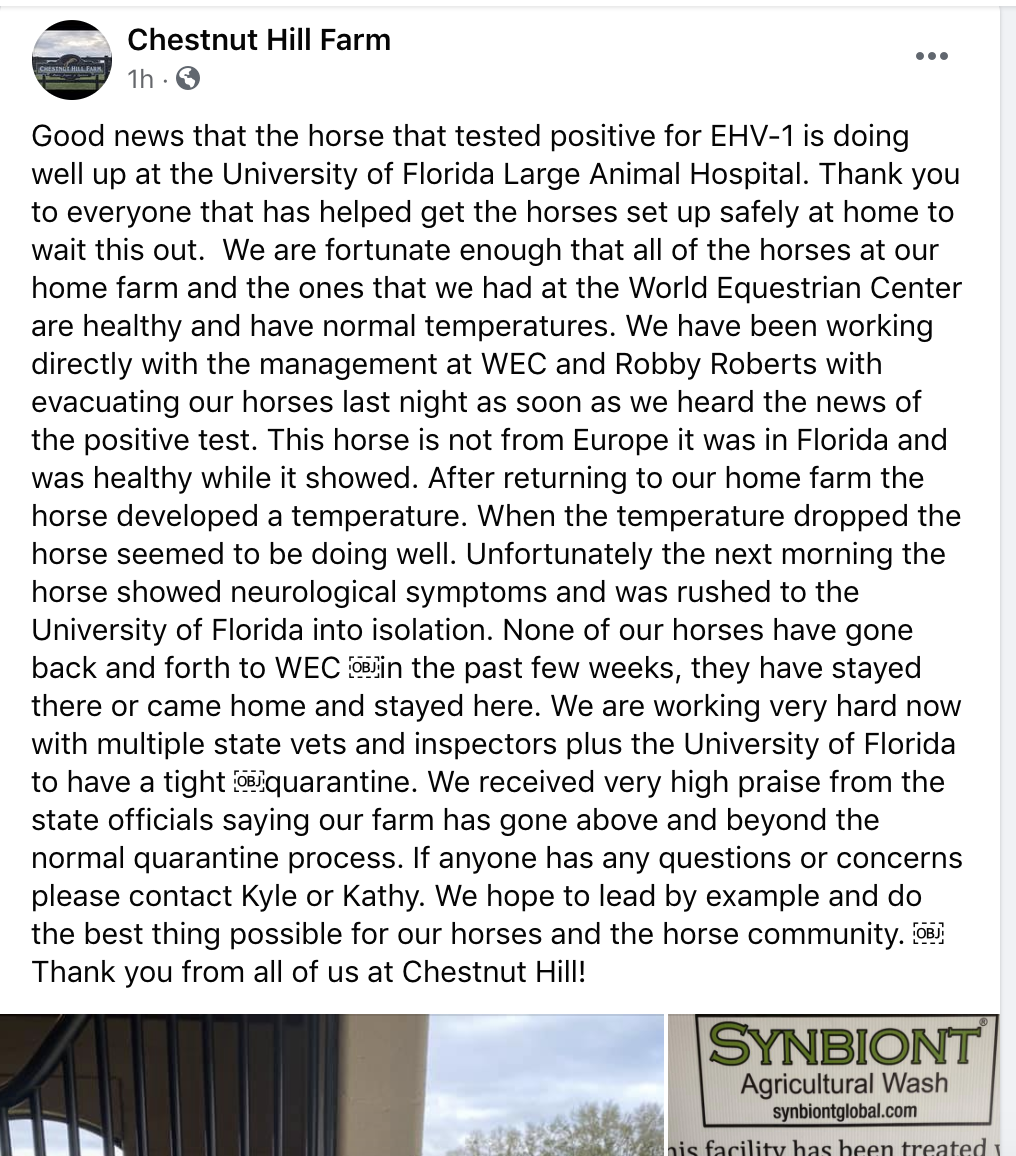This post originally appeared on Eventing Nation.

We continue to monitor the EHV-1 outbreak in Europe, which has forced the cancellation of all FEI events on the European mainland in an effort to contain it. The outbreak, which began in Valencia, Spain, had claimed the lives of four horses as of March 1, and 84 on-site horses were also exhibiting clinical signs. The venue was hosting a show jumping competition at the time of the outbreak.
Wednesday morning, March 3, the FEI has released a further update on the EHV-1 outbreak in Europe, noting that 15 horses are currently being treated at external veterinary clinics in Valencia and Barcelona. Since the first fatalities at Valencia, two other horse deaths have been reported in Barcelona and Germany, bringing the total toll to six.
Also on Wednesday, the World Equestrian Center – Ocala reported that its management had been made aware of a case of EHV-1 in Ocala. The case was not reported on the grounds of the World Equestrian Center. At the time of this article’s publication, calls to the Florida Department of Agriculture to confirm details of this case had not been returned. A map (updated as cases are brought to the department’s attention or at the first of the month) of reportable equine diseases is maintained by the Department of Agriculture and can be found here.
Update 3:20 p.m. EST: EN has confirmed with the Florida Department of Agriculture and Consumer Services that a single case of EHV-1 was reported on March 1 out of Marion County, where Ocala is located. A horse showing neurological symptoms is being treated at an isolated facility, according to a spokesperson.
The World Equestrian Center – Ocala also issued a travel restriction out of an abundance of caution Wednesday afternoon prohibiting ship-in horses or horses arriving from other venues such as the Winter Equestrian Festival in Wellington. US Equestrian has also acknowledged the case and will continue to monitor the situation, recommending the restriction of horses’ movements in the meantime.
EHV-1 cases have also been reported in Canada, with one key outbreak occurring in Quebec in February at Venturing Hills Equestrian Farm. A fundraising effort to assist this farm, which has seen two horses die and at least 18 infected, can be found here.
We will continue to provide updates on this situation as they become available. To view the latest biosecurity updates from the FEI, click here.
A US Equestrian press release outlining precautionary recommendations and compliance protocol reads as follows:
A recent outbreak of an aggressive strain of the neurological form of Equine Herpes Virus (EHV) has resulted in the immediate cancellation of international events in 10 countries on the European mainland through March 28, 2021. The outbreak originated at a competition in Valencia, Spain, and is present in at least three other countries in Europe to date. There are no current EHV-1 outbreaks related to the Valencia competition evident in the U.S. at this time, but USEF is recommending members take important steps to protect their horses. USEF is working closely with competition organizers and veterinarians to ensure we are as prepared as possible for a potential outbreak in the U.S.
Below are some best practices you can implement immediately:
- Review and ensure you are prepared for quick implementation of an isolation plan at a competition grounds and/or at your home farm or facility
- Check your horse’s temperature twice daily and maintain a temperature log
- Isolate horses at first signs of symptoms or illness and contact your vet immediately
- Keep separate feed buckets, brushes, rags, and tack/equipment for each horse
- Ask your veterinarian about appropriate cleaning solutions
- Eliminate communal or shared water troughs and buckets
- Practice hand washing in between handling horses
- Maintain social distancing for horses; limit nose to nose contact with other horses at the ring
- Ensure your horse is vaccinated for EHV (Rhinopneumonitis vaccine) in line with GR845
Please note that the vaccine does not protect against the neurological form of EHV, which is referred to as Equine Herpes Myeloencephalopathy (EHM) but does reduce the clinical signs and shedding of the virus. Early identification and reporting of ill horses is critical in order to trace possible points of exposure and to aid in the prevention of further spread of the disease. The first 30 minutes following identification of a potentially infectious horse frequently determines the extent and scope of transmission and potential outbreak. You should contact your veterinarian immediately for testing if a horse begins to display any symptoms of EHV. Competition managers should also be notified if the horse is at a competition.
If you are aware of individuals who are not following proper reporting protocols, please contact Debbie Saliling, USEF Director of Compliance, at compliance@usef.org.
Update: Chestnut Hill Farm recently posted this update on their Facebook page.

